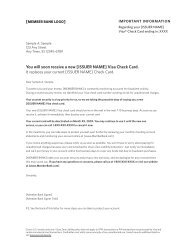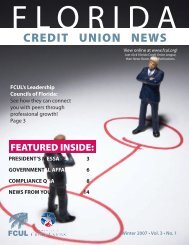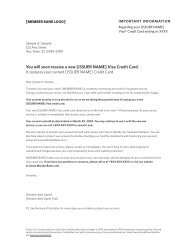credit union news - Home - Welcome to Florida Credit Union League
credit union news - Home - Welcome to Florida Credit Union League
credit union news - Home - Welcome to Florida Credit Union League
Create successful ePaper yourself
Turn your PDF publications into a flip-book with our unique Google optimized e-Paper software.
Investment terms definedContinued from page 5if the holder of the security never sells the security, the loss willnever be realized, assuming that it does not default. Because of therecent dislocation in the market, many <strong>credit</strong> <strong>union</strong>s are incurring asubstantial decline in the value of the securities in their portfolio. Ifthese instruments were designated as available for sale per FAS 115, thisdecline will appear as an unrealized loss in the equity portion of the <strong>credit</strong><strong>union</strong>’s balance sheet.Sub Prime Mortgages: A mortgage made <strong>to</strong> a borrower with poor<strong>credit</strong>, generally defined as a FICO score of less than 620.Asset Backed Securities (ABS): A debt instrument created by placinga pool of receivables in a trust. The repayment of the security isprovided by the cash flows generated by the underlying receivables.Generally the receivables supporting the security are loans generatedby <strong>credit</strong> cards, student loans, au<strong>to</strong>mobile loans or leases, dealerau<strong>to</strong>mobile inven<strong>to</strong>ries and mortgages. The instruments are created<strong>to</strong> shift the <strong>credit</strong> risk inherent in the loans such that the senior bondholders are insulated from losses by the subordinate holders becausethe subordinate holders incur the losses first (the various classes arereferred <strong>to</strong> as “tranches”). Forms of <strong>credit</strong> enhancement include overcollateralization,excess spread or an insurance policy which guaranteespayment. Generally, the most senior bonds within a structure willreceive an AAA rating.Collateralized Debt Obligation (CDO): A CDO is a more complextype of asset-backed security <strong>credit</strong> product backed by a portfolio offixed-income assets, including asset backed securities (referred <strong>to</strong> as astructured finance CDO), corporate bonds or <strong>credit</strong>-linked references(referred <strong>to</strong> as a cash or synthetic CDO), or real estate. These assetsare also divided in<strong>to</strong> tranches in order <strong>to</strong> insulate the senior bondholders from <strong>credit</strong> losses. During 2006 and 2007 many CDOs werecreated by using lower-rated real estate based (including sub prime)ABS. Due <strong>to</strong> the combination of the weakening performance of theunderlying collateral, poor liquidity in the market, and erroneouscorrelation assumptions in the CDO’s construction, CDO values havedeclined substantially during the current <strong>credit</strong> crunch. CDOs that arecollateralized by existing CDOs are called CDO squareds (yes, there areeven CDO cubeds).substantial losses and threatening their AAAratings. Recently Standard and Poors andMoodys confirmed MBIA and AMBACs ratingswhile Moody’s downgraded FGIC.Structured Investment Vehicle (SIV): A SIV is afund which generally borrows short by issuingcommercial paper <strong>to</strong> institutional inves<strong>to</strong>rsand then invests long, frequently purchasingasset backed securities. Many of these SIVswere created by banks and, when marketanxiety increased, the SIVs were not able <strong>to</strong>issue new commercial paper <strong>to</strong> replace whatmatured. Most of the assets supporting thebank sponsored SIVs have been placed backon the bank balance sheets.Using these definitions, we can summarizethe current state of the <strong>credit</strong> markets bystating: The market dislocation caused bydeteriorating performance in the mortgagemarket (especially the subprime arena) has led<strong>to</strong> unrealized losses by holders of highly ratedABS. Holders of less highly rated (and less wellstructured)debt have experienced significantlymore real losses than were previously thoughtpossible, leading <strong>to</strong> the forced closure ofmany bank SIVs, the abandonment of the ARSmarket by many large broker/dealers, and thelikelihood of significant insurance paymentsfrom bond insurers over the coming years.Southeast Corporate is pleased <strong>to</strong> offerreaders a free Investment Glossary of Terms,simply email marketing@secorp.org with yourrequest.Bond insurers: Also referred <strong>to</strong> as monoline insurers, these areinsurance companies that insure (or “wrap”) bonds in order <strong>to</strong> ensurethey will get the highest rating s from the rating agencies. Originally,the companies began insuring that municipalities would remit thepayments required on the bonds they issued. Over the course of thelast ten years, these companies moved aggressively in<strong>to</strong> the ABSmarkets and in particular the subprime and CDO markets, creatingSpring 2008 17







